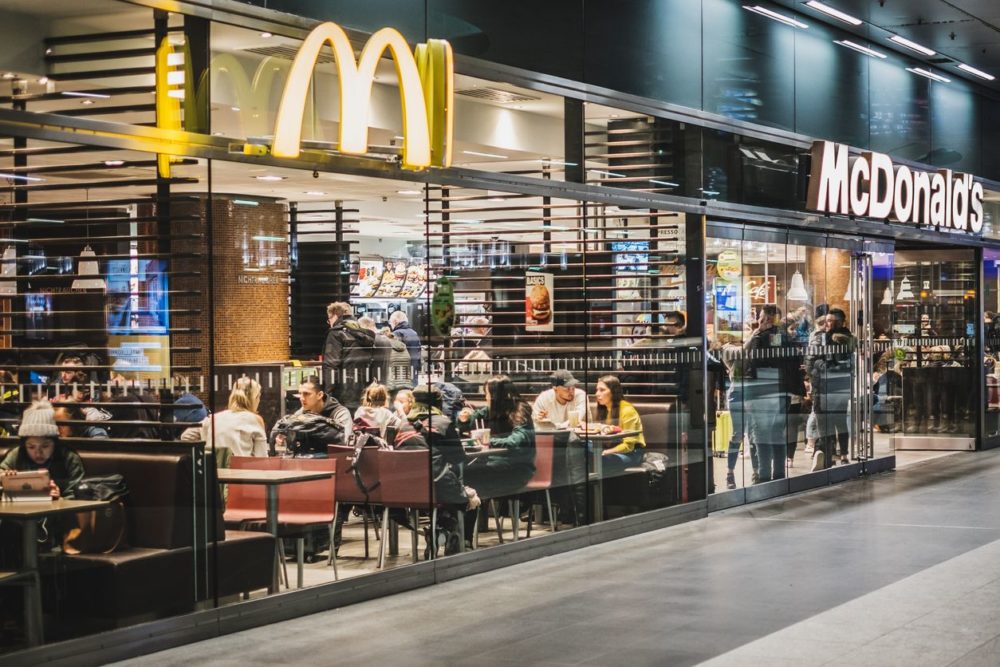Six major fast food companies have made “significant progress” on setting and executing science-based climate targets but need to do more work on water use and pollution, according to a new report from sustainability-focused investor network FAIRR and nonprofit Ceres.
The report also raises concerns about a lack of action and transparency in these brands’ animal protein supply chains, which are often major contributors to Scope 3 emissions.
“To meet their climate and water ambitions, QSRs will have to address the challenges in animal agriculture supply chains, the report notes. “Companies will benefit from setting strong sourcing policies and engagement with meat and dairy suppliers to align suppliers with corporate targets.”
FAIRR represents the sustainability interests of hundreds of institutional investors, while Ceres’s Investor Network on Climate Risk & Sustainability comprises 163 institutional investors. In 2019, the two formed a coalition of investors with combined assets of $6.5 trillion. Dubbed the Global Investor Engagement on Meat Sourcing, it aims to push fast-food brands towards de-risking their meat and dairy supply chains and reducing their water-related impacts.
The coalition is currently engaged with six brands: Chipotle, Domino’s Pizza, McDonald’s, Burger King parent company Restaurant Brands International (RBI), Wendy’s Co., and Yum! Brands, which owns KFC, Pizza Hut, and Taco Bell.
As the report notes, all six of these fast food companies have made “notable progress in addressing investor requests to analyze the climate impact of QSRs.” Wendy’s and Domino’s have stated they will set global GHG reduction targets approved by the Science-Based Targets initiative (SBTi). All other brands on the list have already set such targets. Chipotle’s are currently the most ambitious, with a SBTi-approved absolute target to reduce Scope 1, 2, and 3 GHG emissions by 50% by 2030 from a 2019 base year.
Water efforts fall ‘dramatically’ short
All six brands are severely lacking when it comes to tracking water pollution and consumption in their supply chains. None of the companies disclose progress in this area, and FAIRR’s report called this “the worst-performing” area of the entire engagement.
“While companies have initiated projects to implement agricultural practices known to reduce water use and pollution, these activities fall dramatically short of meaningfully reducing the externalities caused by animal protein supply chains and are not likely to sufficiently mitigate physical risks to the meat supply chain from droughts, flooding, and regulatory and reputational risks related to water pollution,” the report states.
To build a truly resilient agricultural supply chain, these companies must integrate water into everyday decision-making. A first step would be conducting comprehensive water risk assessments of their animal protein supply chains, says FAIRR.
McDonald’s is so far the only one of the six companies to have actually conducted a water risk analysis. Chipotle has plans to do so by the end of 2022.
Lack of alignment with suppliers
More than 90% of the six companies’ emissions come from Scope 3 emissions where the meat and dairy supply chain plays a key role. Just two of the six businesses engaged by the coalition disclose total emissions from animal agriculture: RBI and Yum! say that meat and dairy suppliers are responsible for more than half (57% and 51%, respectively) of their total emissions.
A lack of reporting on animal protein supply chains is a major challenge for the entire fast-food sector. “QSRs are not aligning supplier policies with their corporate climate and water commitments,” states the FAIRR report, which then calls the current environmental requirements of supplier policies “not fit for purpose to deliver the GHG emissions reductions and water-related risk mitigation measures urgently needed in agricultural supply chains.”
Companies’ supplier agreements currently have no clear requirements or policies. Cristina Figaredo, senior manager of research & engagement at FAIRR, said in a statement that this lack of alignment “risks undermining the efforts of these high-street brands to tackle climate risk.”
FAIRR recommends these companies develop supplier policies that act as an extension of the company’s climate and water commitments. In other words, like water, supplier emissions need to become a part of day-to-day decision-making for all involved.
Additional recommendations:
FAIRR and Ceres lay out several recommendations for fast food brands as next steps. Among them are:
- That fast-food brands publicly and frequently disclose climate and water risks to their boards as well as efforts to address them.
- That companies lay out detailed implementation plans for emissions reductions to meet their targets.
- That brands develop “robust” policies and regularly audit their progress





